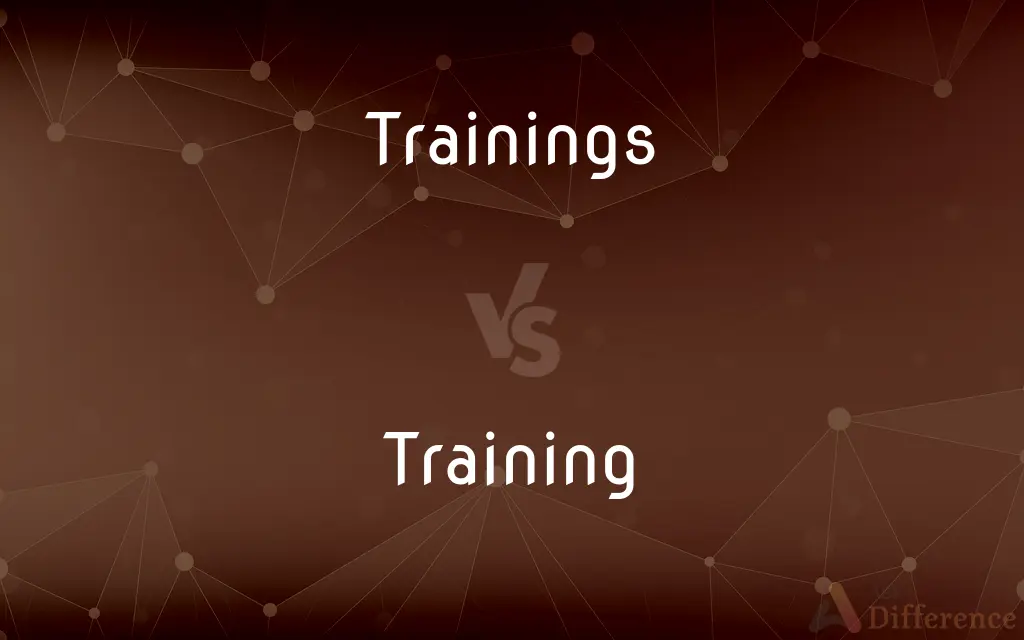Trainings vs. Training — What's the Difference?
By Tayyaba Rehman & Urooj Arif — Updated on March 29, 2024
Training refers to the process of teaching or learning specific skills, focusing on singular or collective educational activities, while trainings emphasize multiple instances or types of such educational sessions.

Difference Between Trainings and Training
Table of Contents
ADVERTISEMENT
Key Differences
Training typically encompasses both the act and the content of teaching or developing skills and knowledge in a specific area. It can refer to a singular session or a comprehensive program designed to enhance abilities in a particular field. On the other hand, trainings are often used to denote multiple sessions, courses, or types of instruction, highlighting the variety or volume of educational opportunities available.
The term "training" suggests a continuous, often singular process where the focus is on the progression and development of skills over time. It might involve various methodologies and tools but is united under the goal of skill enhancement. Trainings, however, can refer to distinct, separate educational events or modules, each possibly targeting different skills or knowledge areas, emphasizing the diversity within the educational process.
When discussing the impact on an individual's career or development, "training" is typically used to describe the overall process and its role in professional growth. This usage implies a holistic approach to learning. In contrast, mentioning "trainings" might highlight the completion of multiple, distinct programs or courses, underscoring the breadth of an individual's educational experiences.
In organizational contexts, "training" is often used to describe the planned development strategy for employees, encompassing a range of activities designed to improve performance and efficiency. Whereas "trainings" can be used to specify the array of programs available or undertaken, indicating the organization's commitment to diverse learning opportunities.
The choice between "training" and "trainings" can also reflect the speaker's focus. Using "training" highlights the concept of learning as a continuous, cohesive process. In contrast, "trainings" emphasizes the number or variety of educational experiences, suggesting a collection of discrete learning opportunities.
ADVERTISEMENT
Comparison Chart
Definition
The process or activity of teaching skills or knowledge.
Multiple instances or types of instructional sessions.
Focus
On the continuous development of skills.
On the diversity or number of educational sessions.
Usage Context
Refers to a holistic or singular educational experience.
Used when referring to several different learning opportunities.
Implication
Suggests an ongoing or comprehensive approach to learning.
Highlights the variety and volume of learning experiences.
Organizational Use
Describes the overall strategy for employee development.
Specifies the range of programs offered or completed.
Compare with Definitions
Trainings
Educational process aimed at professional development.
Ongoing training is essential for staying current in the tech industry.
Training
The act of undergoing multiple training sessions in different areas.
Through various trainings, he developed a diverse set of skills.
Trainings
Singular or collective educational activity focused on skill enhancement.
His training in emergency response prepared him for the role.
Training
Multiple educational sessions or courses focused on various skills.
The conference offers several trainings on project management and leadership.
Trainings
The act of developing skills or knowledge through practice and instruction.
She received training in digital marketing to enhance her skills.
Training
A collection of distinct learning events or modules.
Her resume lists trainings in three different programming languages.
Trainings
The methodology and tools used in teaching specific competencies.
The company invests heavily in training tools and resources.
Training
An emphasis on the quantity or diversity of educational experiences.
The organization's trainings cover everything from safety to customer service.
Trainings
A specific program designed to improve or teach new abilities.
The new employee orientation includes a two-week training on company policies.
Training
Various types of instruction or educational opportunities.
Employees are encouraged to participate in multiple trainings throughout the year.
Trainings
Plural of training
Training
Training is teaching, or developing in oneself or others, any skills and knowledge or fitness that relate to specific useful competencies. Training has specific goals of improving one's capability, capacity, productivity and performance.
Training
The process or routine of one who trains.
Training
The state of being trained.
Training
Present participle of train
Training
Action of the verb to train. en
Training
The activity of imparting and acquiring skills.
Training
The result of good social upbringing.
Training
(computing) The process by which two modems determine which protocol and speed to use; handshaking.
Training
(voice recognition) The recording of multiple samples of a user's voice to aid pattern recognition.
Training
The act of one who trains; the act or process of exercising, disciplining, etc.; education.
Training
Activity leading to skilled behavior
Training
The result of good upbringing (especially knowledge of correct social behavior);
A woman of breeding and refinement
Common Curiosities
Is it correct to use trainings to describe learning experiences?
Yes, using "trainings" is correct when highlighting or discussing various distinct learning experiences or educational sessions.
Can training be both singular and plural?
Yes, "training" can refer to a singular session or the overall concept of skill development, but it is typically used in a singular or collective sense rather than plural.
How do organizations use the term training?
Organizations use "training" to describe their comprehensive approach to employee development, focusing on continuous learning and skill improvement.
How does training impact professional development?
Training plays a crucial role in professional development by enhancing skills, knowledge, and performance, contributing to career growth.
What is the difference between training and trainings?
Training refers to the act or process of teaching skills, often viewed as a singular or holistic process, whereas trainings denote multiple educational sessions or courses.
What makes a training effective?
An effective training is well-structured, relevant to the learner's needs, engaging, and provides practical knowledge or skills that can be applied.
How do trainings contribute to organizational success?
Trainings contribute to organizational success by enhancing employee skills, improving performance, and fostering a culture of continuous learning.
Can trainings be customized for individual needs?
Yes, trainings can be customized to meet the specific needs, goals, and learning styles of individuals or groups.
Why might someone refer to multiple trainings?
Referring to multiple "trainings" emphasizes the variety or number of specific sessions or courses an individual has completed or that are offered.
Are online courses considered training or trainings?
Online courses can be considered both; "training" if referring to the act or process of learning, and "trainings" when highlighting multiple courses.
Can training be informal, or does it always refer to formal education?
Training can be both formal and informal, including structured programs as well as more casual learning and skill development experiences.
Do trainings have to be completed in person?
No, trainings can be completed in person, online, or through a hybrid approach, encompassing a wide range of learning modalities.
Can training be self-directed, or does it require a trainer?
Training can be self-directed, especially with the availability of online resources and courses, though it may also involve trainers or instructors.
How does the concept of lifelong learning relate to training?
Lifelong learning encompasses the ongoing pursuit of knowledge and skills, for which continuous training, in its various forms, is a key component.
What is the role of feedback in training?
Feedback plays a vital role in training by helping learners understand their progress, areas for improvement, and reinforcing learning.
Share Your Discovery

Previous Comparison
Draft vs. Mobilization
Next Comparison
Reunition vs. ReunionAuthor Spotlight
Written by
Tayyaba RehmanTayyaba Rehman is a distinguished writer, currently serving as a primary contributor to askdifference.com. As a researcher in semantics and etymology, Tayyaba's passion for the complexity of languages and their distinctions has found a perfect home on the platform. Tayyaba delves into the intricacies of language, distinguishing between commonly confused words and phrases, thereby providing clarity for readers worldwide.
Co-written by
Urooj ArifUrooj is a skilled content writer at Ask Difference, known for her exceptional ability to simplify complex topics into engaging and informative content. With a passion for research and a flair for clear, concise writing, she consistently delivers articles that resonate with our diverse audience.
















































